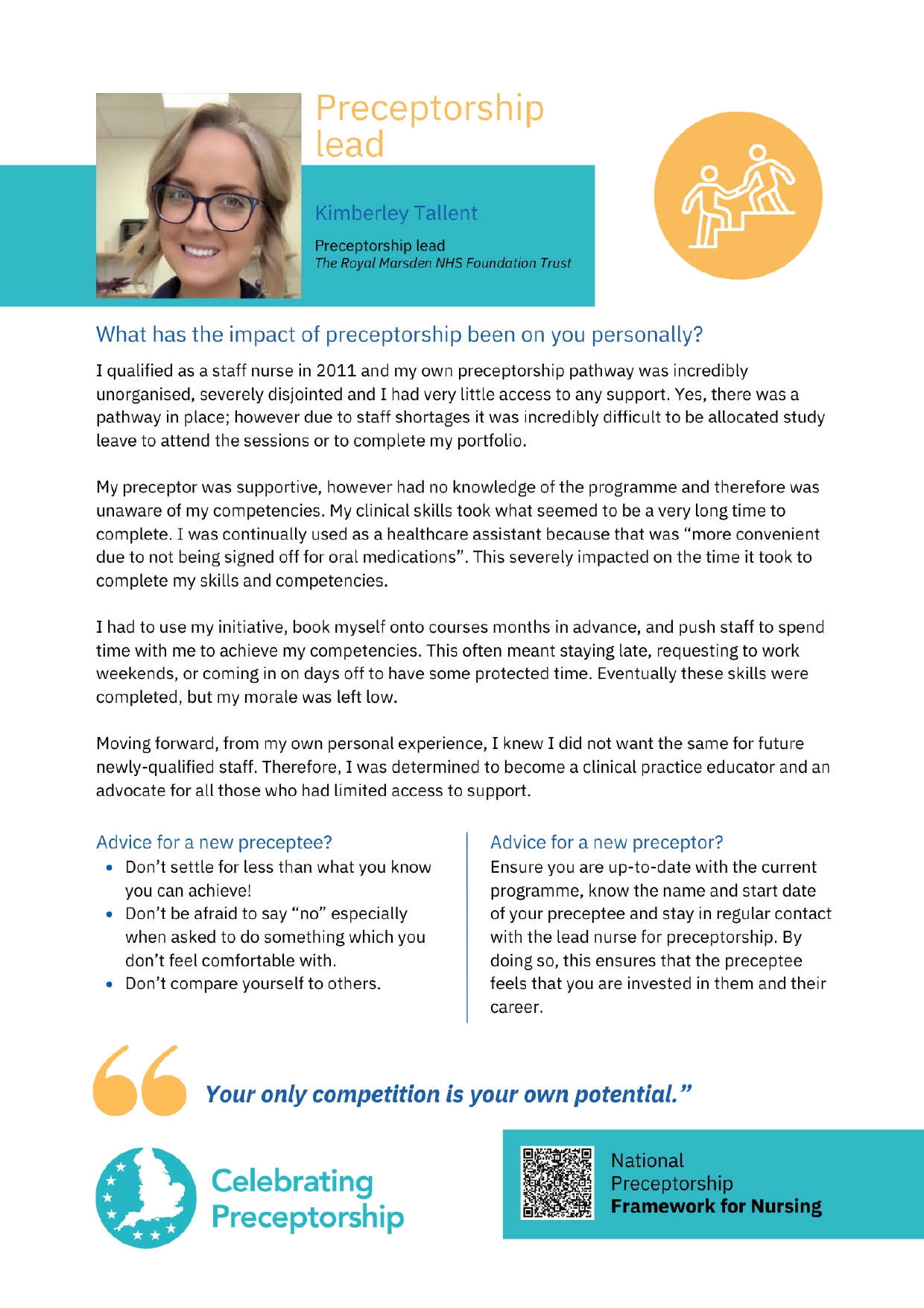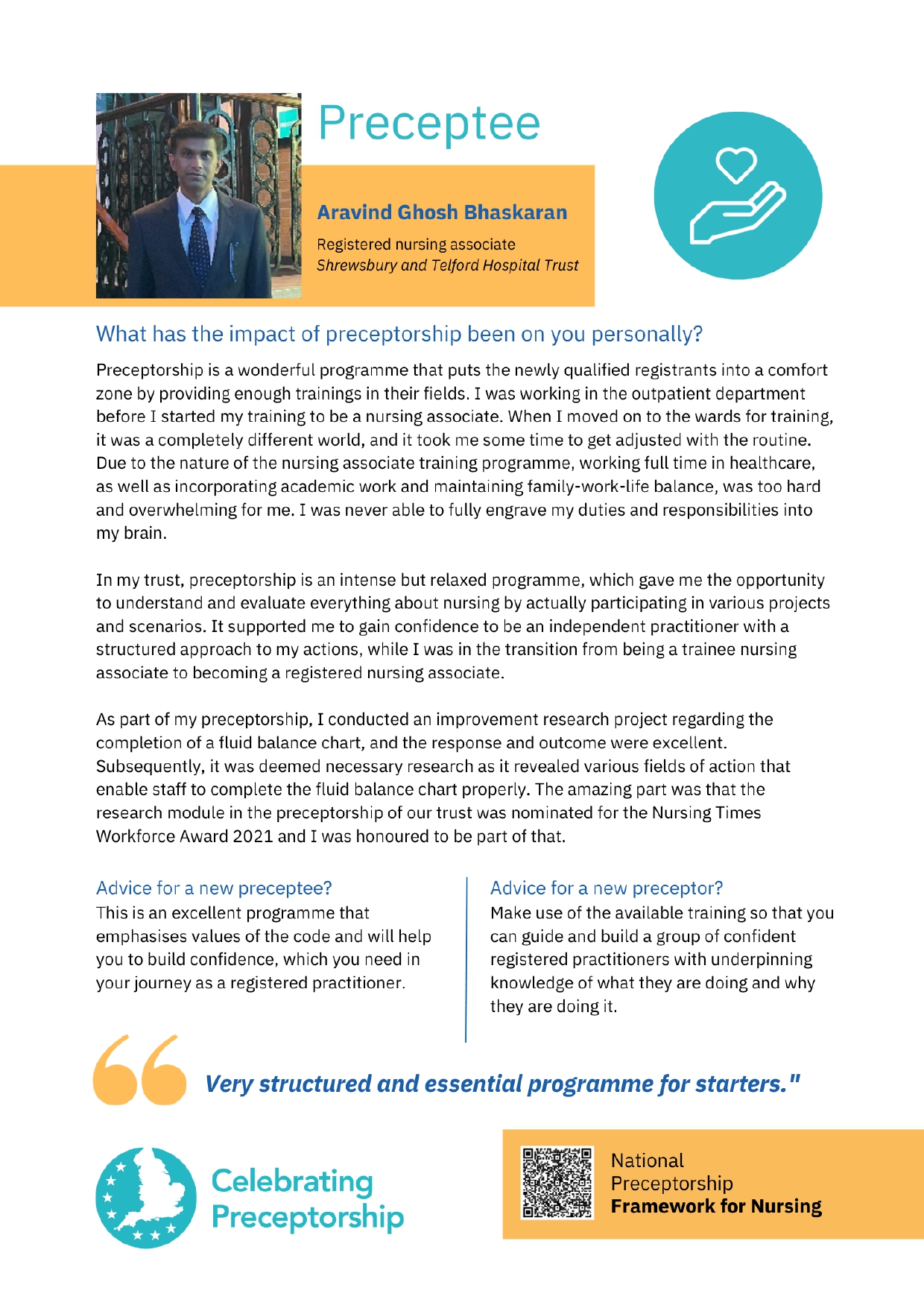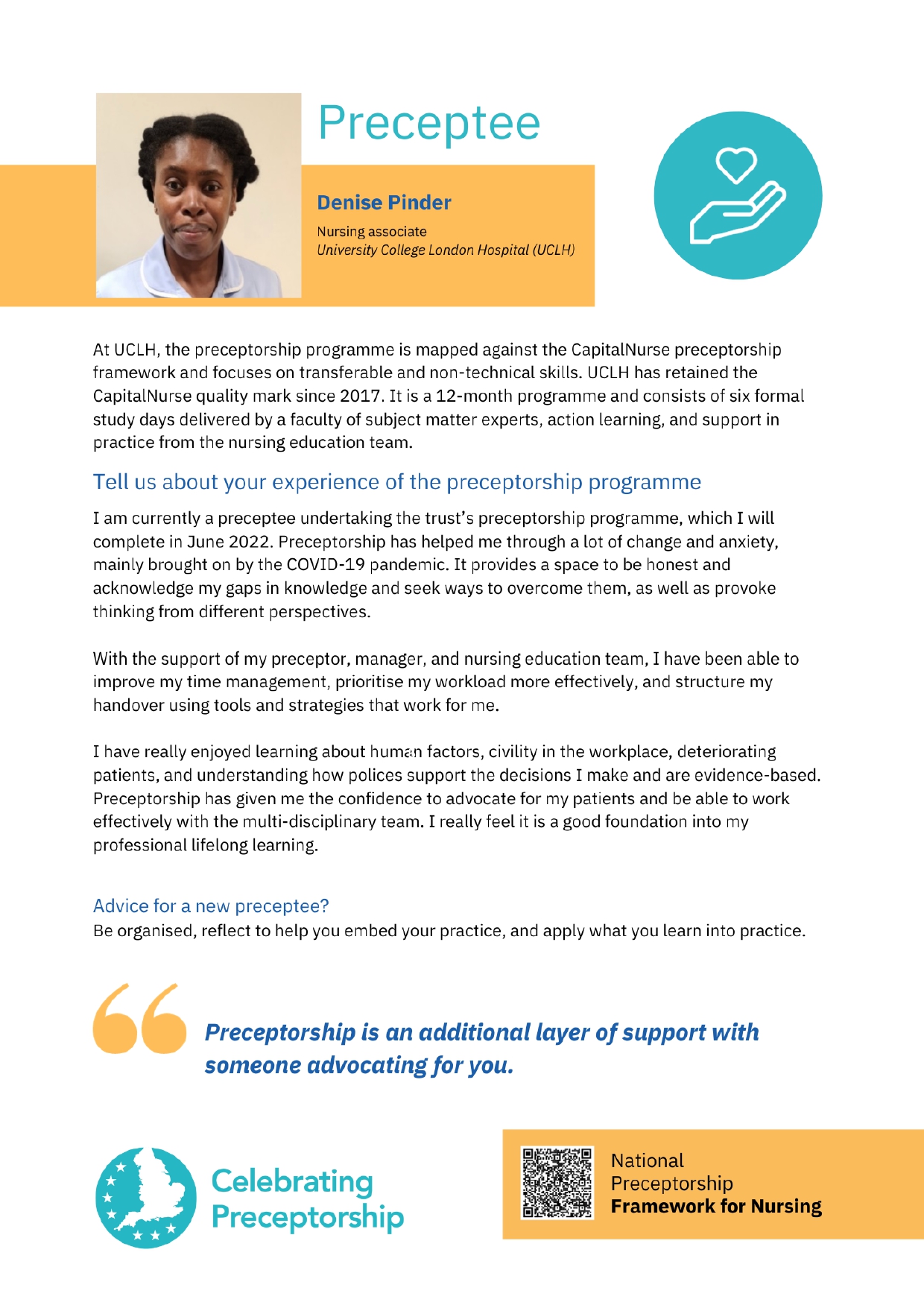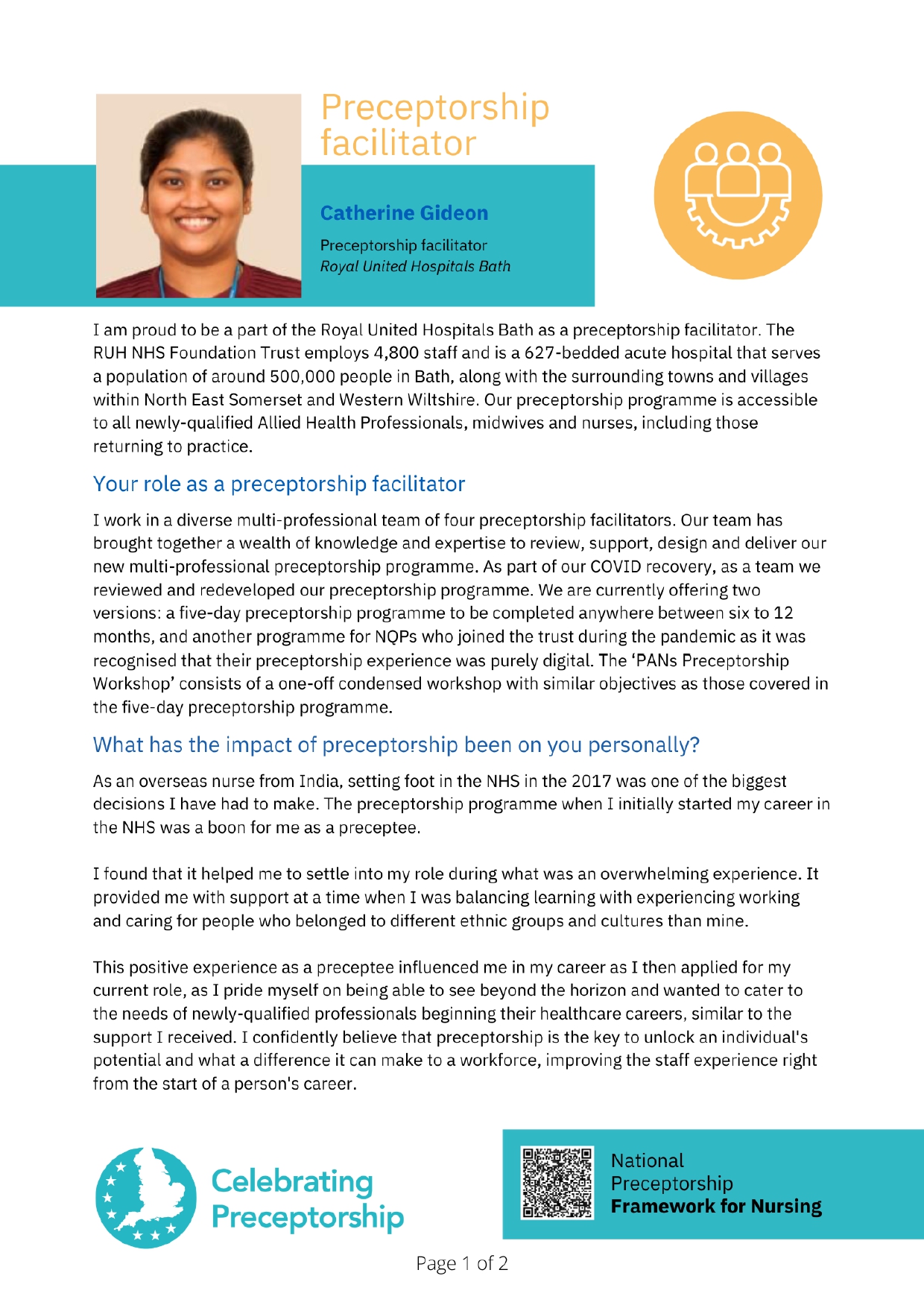Preceptorship in Primary Care
Nurse Associates
Principles of preceptorship
Preceptorship is the structured start for newly registered nurses, midwives and nursing associates.
What is preceptorship?
The main aim of preceptorship is to welcome and integrate newly registered professionals into their new team and place of work. It helps these professionals translate their knowledge into everyday practice, grow in confidence and understand how to apply the Code in their day to day work.
Preceptorship isn’t designed to replace appraisals, be a substitute for a formal induction and mandatory training, or be a way to re-test or repeat any knowledge and skills that a professional needs to register on the NMC register.
What are the benefits of preceptorship?
Although voluntary, we know preceptorship helps newly registered professionals have the best possible start as a registered professional in the UK.
We know preceptorship has a variety of benefits for employers and preceptees, among others.
Benefits for nurses, midwives and nursing associates:
- Preceptorship offers the structured support needed to transition their knowledge into everyday practice successfully.
- It provides a lifelong journey of reflection and the ability to self-identify continuing professional development needs.
- A positive preceptorship experience is reported to result in newly registered nurses, midwives and nursing associates having increased confidence and sense of belonging, feeling valued by their employer.
Benefits for employers:
- Effective preceptorship outcomes are linked to improved recruitment and retention. Attracting and retaining skilled nurses, midwives, and nursing associates is important for delivering better, safe and effective care.
Who are our principles of preceptorship for?
Our principles for preceptorship are for professionals who design and oversee preceptorship programmes, those engaged on preceptorship programmes (preceptees) and those who support preceptees (preceptors).
Our principles are there to support organisations and employers across the UK to achieve consistently high quality and effective preceptorship for every newly registered nurse, midwife and nursing associate in the UK.
These principles can be applied to registered professionals joining a new part of the NMC register, people returning to practise after re-joining the register and those coming to work in the UK from within or outside the EEA/EU.
How we developed our principles of preceptorship
We created the principles in collaboration with the four Chief Nursing and Chief Midwifery Officers in the UK in recognition of this important period in a professional’s nursing, midwifery or nursing associates career.
It was timely to update our previous position on preceptorship and align our principles to our new pre-registration standards.
Principles of preceptorship
1. Organisational culture and preceptorship
A period of preceptorship immerses the newly registered nurse, midwife and nursing associate into their professional role and into the ways of working and culture of their new workplace.
A good organisational culture that supports preceptorship will have the following characteristics:
- It is kind, fair, impartial, transparent, collaborative and fosters good interprofessional and multi-agency relationships
- There is an understanding of the importance of having systems and processes in place to support and build confidence of newly registered nurses, midwives and nursing associates
- There is an approach to preceptorship that prioritises individual mental and physical health and wellbeing, and promotes accountability, self-reflection and safe practice in accordance with with the Code.
2. Quality and oversight of preceptorship
Being committed to the Principles of Preceptorship and having preceptorship programmes available/running are seen as key activities within the organisation. There is evidence of management of the process, and evaluation of its efficacy and outcome.
To ensure effective preceptorship:
- There are processes in place to identify those who require preceptorship
- There is sufficient preceptor capacity to support all of those who require preceptorship
- The employer, preceptees and preceptors understand and comply with national and local policies, and the relevant governance requirements required by the four countries of the UK
- Preceptorship activities should complement the preceptees’ induction and orientation into the local workplace
- There is recognition of the impact of system challenges on effective preceptorship and how to mitigate these
- Processes are in place to monitor, evaluate and review preceptorship programmes
- There is a governance framework around preceptorship which allows the process to be audited and reported.
3. Preceptee empowerment
Preceptorship is tailored to the individual nurse, midwife and nursing associate preceptee’s new role and the health or care setting. It seeks to recognise and support the needs of the preceptee to promote their confidence in their professional healthcare role.
In effective preceptorship models, preceptees:
- Are provided with the appropriate resources to enable them to develop confidence as newly registered nurses, midwives and nursing associates
- Are supported according to their individual learning needs
- Are supported by a nominated preceptor
- Have opportunities for reflection and feedback to support their approach to preparing for revalidation
- Are empowered to work in partnership with preceptors and are able to influence the content and length of their preceptorship programme to meet both individual and organisational needs.
4. Preparing preceptors for their supporting role
Preceptors should receive appropriate preparation to understand and undertake their role.
In effective preceptorship models, preceptors:
- Act as professional role models
- Receive ongoing support and actively engage in professional development
- Are supportive and constructive in their approach to the preceptee
- Share effective practice and learn from others
- Seek and are given feedback on the quality of all aspects of their preceptorship role.
5. The preceptorship programme
Preceptorship should take account of the setting in which the individual nurse, midwife and nursing associate is working and providing care. These principles apply to any health or social care setting across UK, including the NHS, the social care sector, and the independent and charitable sectors.
Preceptorship programmes will:
- Be timely and align with the start of a new employment role
- Recognise the knowledge, skills, attributes and competence nurses, midwives and nursing associates have at the point of registration
- Seek to ensure that activities within the programme are agreed with the individual preceptee
- Vary in length and content according to the needs of the individual nurse, midwife and nursing associate and the organisation. Individual countries, regions or organisations may set minimum or maximum lengths for preceptorship
- Include activities designed to welcome and integrate the preceptee into the team and place of work
- Be designed to ensure that it is possible for the preceptee to meet the aims and outcomes of the preceptorship programme within the agreed timeframe.
Preceptee Case Studies
Preceptorship Lead Case Studies

What has the impact of preceptorship been on you personally?
I qualified as a staff nurse in 2011 and my own preceptorship pathway was incredibly unorganised, severely disjointed and I had very little access to any support. Yes, there was a pathway in place; however due to staff shortages it was incredibly difficult to be allocated study leave to attend the sessions or to complete my portfolio.
Preceptorship Development Lead
Preceptorship Facilitator
Useful Resources
Click on the following links for more information:
NHS England » National preceptorship framework for nursing
NHS England National Preceptorship Programme – National Workforce Skills Development Unit
Preceptorship-Journey-Academics-online.pdf (workforceskills.nhs.uk)
Preceptorship-Journey-Registered-Nurse-online.pdf (workforceskills.nhs.uk)
Criteria-15-preceptorship-champions.pdf (workforceskills.nhs.uk)
Criteria-5-Protected-time-examples-Nov-23.png (1414×2000) (workforceskills.nhs.uk)
Preceptor Development Resources – National Workforce Skills Development Unit
Fundamentals of General Practice
If you are new in post as a General Practice (GP) Nurse, this course will equip you with all the core skills required for the role. It is aligned to the HEE Career Framework for General Practice.
This module is designed to support registered nurses and nursing associates new to general practice to develop the knowledge and skills required to work safely, providing high quality care in making the transition into the general practice environment. The module is designed to support you to develop the knowledge and skills required to work safely, providing high quality care in making the transition into the general practice environment. This module can be accessed as a stand-alone module or as part of an award. The module encompasses the course aims being, practice led with a focus on interdisciplinary team working and being employability driven.
Other resources and templates
The following resources have been created by the Greater Manchester Combined Authority (GMCA) and NHS in Greater Manchester.
The links below provides a description for the nine domains of the Nurse Career Framework to inform preceptee development programmes to be completed over the 12 months, an example formal agreement between the preceptor and the preceptee.
Any queries or require further information
Please contact Shelly Caines, Healthcare and Nurse Associate Facilitator and Practice Educator for BSol Training Hub.


























